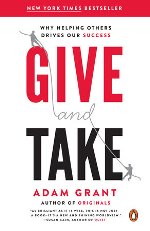BOOK REVIEW
 Book Title: Give and Take: Why Helping Others Drives Our Success
Book Title: Give and Take: Why Helping Others Drives Our Success
Author: Adam Grant
Publisher: Penguin Random House
List Price: $28.00 ($18 soft cover)
Format: Hard or Soft cover, 320 pages
Publication Date: 2013
ISBN: 9780143124986
Reviewer: Sara Piracha
Review Date: August/September 2022
Introduction
Even though Adam Grant’s Give and Take is not dedicated exclusively to the art of project management, I find the content of this book very appealing; the advice is simple yet very effective when applied correctly. This book is an excellent resource for anyone eager to learn and grow as an employee and as an individual.
Overview of Book’s Structure
The book actually starts with a warning chapter which is unusual. It forewarns the reader of the dangers and repercussions of giving more than you get. After that it dives into the three reciprocity styles: Takers, Matchers, Givers. The first few chapters showcase the thought process behind the reciprocity styles, the motivations, the fears and the best ways to identify each one.
The second and third chapters focus on how givers, takers and matchers develop their networks and how their interactions create consequences that shape the fate of these networks. These chapters are important because they teach us effective methods that we can use to identify takers, matchers and givers in our dealings. There are clues that can help us spot a Taker in a Giver’s clothes. A perfect example of such a person is Kenneth Lay, the former CEO of Enron. The picture of Ken Lay is juxtaposed next to Jon Huntsman Sr. in the annual reports of their organizations to highlight the contrast between their leadership styles. Takers work hard to seize the spotlight and credit. On the other hand, givers work hard to create more givers. Matchers are more concerned about paying back than paying forward.
The rest of the book focuses on why giver’s succeed, how they succeed and what sets them apart from takers and matchers. In my opinion, the key takeaways from these chapters are the qualities that all effective givers possess such as their modesty which shines through their communication style and their techniques to identify potential in other individuals and develop them into becoming the next generation of givers.
Towards the end of the book, Grant ensures that those who have identified themselves as givers or chosen to become one, are cautious and aware of the “doormat effect”. The doormat effect is evident when givers allow takers to walk all over them. The evidence presented suggests that gender also plays a key role in the success of givers. As a society, most of the time we are pleasantly surprised when men offer to help but consider themselves entitled when the same help is offered by women. However, there is another angle to consider. When men are too generous, they are punished more than women, maybe because they have violated the norms of masculinity. I found this discussion very interesting.
Finally, the last chapter begins with a beautiful quote and summarizes all the main themes discussed in the book. In short, givers measure success by asking themselves what have they done for people around them and if their contributions have enriched the lives of others.
Highlights: What’s New in this Book
The presentation of the concepts is refreshingly novel with a very real not always so pretty picture of our surroundings. The examples used to highlight the styles of giving support that even though our heart may be in the right place and we may even succeed in helping others, but there is always a cost to pay. Giving is an act of kindness done with awareness and cognizance, not a miracle reproducing itself without a source. At work and outside of work, we deal with and are in fact ourselves people with varying motivations and sense of morality. According to Grant, as altruistic as it may be, giving is most effective and cascades only when it is done from taking the ‘otherish’ approach. A concept which emphasizes that the giver must benefit from the act of kindness to prevent burnout. Without otherish giving, both the giver and the recipient suffer because it is not sustainable.
More…
To read entire Book Review, click here
How to cite this review: Piracha, S. (2022). Give and Take: Why Helping Others Drives Our Success, book review, PM World Journal, Vol. XI, Issue X, October. Available online at https://pmworldlibrary.net/wp-content/uploads/2022/10/pmwj122-Oct2022-Piracha-Give-and-Take-book-review-2.pdf
About the Reviewer

Sara Piracha
Texas, USA
![]()
Sara Piracha is a senior associate with KPMG Audit Technology group. Her work focuses on modernizing the audit experience and supporting strategic initiatives with technology. Her areas of expertise include building and maintaining strong relationships with senior audit leaders and stakeholders to understand business objectives and facilitate strategic process redesign.
Sara has worked as a project manager and senior analyst for several Fortune 500 companies. She has an extensive background in finance and accounting. Her project management experience includes a variety of areas ranging from software implementation to auditing and compliance. In her past roles, she has served in various industries including Aerospace, Transportation & Logistics and Healthcare IT.
Email address: sara.piracha@gmail.com
Editor’s note: We publish reviews of books related, either directly or indirectly, to the management of programs and projects. If you have read a good PM-related book recently and would like to publish a book review in the PM World Journal, please contact editor@pmworldjournal.com.
When book reviews are produced in the above format, new knowledge can be created based on the reviewer’s experience, perspective and comments. In that case, authors of book reviews can claim PDUs for PMP recertification from the Project Management Institute, or Professional Development Units from APM in the UK. For clarification, contact editor@pmworldjournal.com.
If you are an author or publisher of a project management-related book, and would like the book reviewed through this program, please contact Editor@pmworldjournal.com.
This book review was the result of a partnership between the PM World Journal and the PMI Dallas Chapter.









